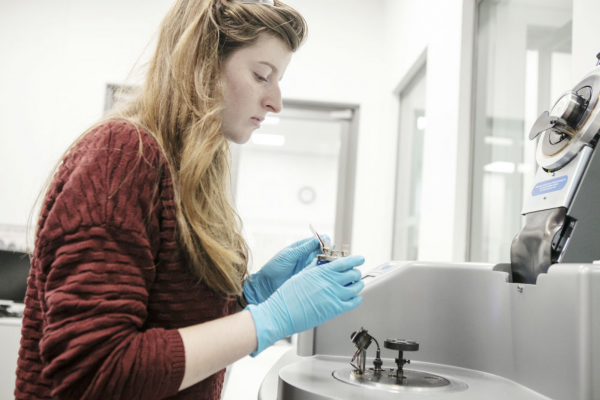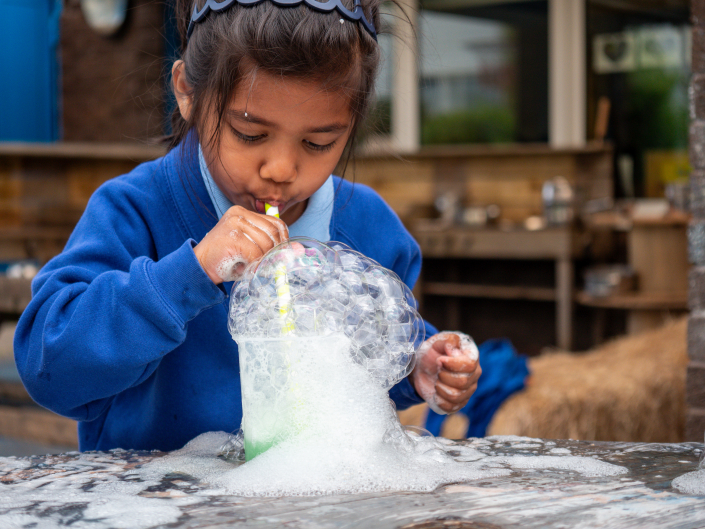Play, Be, C: The Fluid Scientist
Resources and activities themed around a STEM job, to build language and understanding around the world of work.
Resources and activities themed around a STEM job, to build language and understanding around the world of work.

Fluid scientists are interested in what liquids, and gases are like and how they move and behave. Liquids and gases are examples of fluids
Fluid scientists are:
Curious about what different fluids can do and how they might help us.
Observant as they watch fluids carefully to see how they behave.
Resilient when they try lots of tests before they find the best uses for different fluids.
Includes statements from Development Matters (birth to age five) and the relevant ELGs.
Play, Be, C Units provide enabling environments with teaching and support from adults. Reflecting on the characteristics of effective teaching and learning, children will have opportunity to learn and develop by:
- Playing and exploring – children investigate and experience things, and ‘have a go’.
- Active learning – children concentrate and keep on trying if they encounter difficulties and enjoy achievements.
- Creating and thinking critically – children have and develop their own ideas, make links between ideas, and develop strategies for doing things.
Early Years Foundation Stage Statutory Framework: accessed November 2024. Available under the Open Government Licence v3.0.
 Our suggested book for this Unit is Too Many Bubbles by David Gibb, illustrated by Dan Taylor.
Our suggested book for this Unit is Too Many Bubbles by David Gibb, illustrated by Dan Taylor.
You can find out more about the book at the publisher’s page, and the Google Books page will link you to retailers and local libraries.
We have designed these STEM-focused questions to use alongside the questioning you would usually use when reading a story.
These adult led activities and provocations will support the introduction of the fluid scientist career to the children in your setting.






We have included these links to our related STEM at home activities. These could be sent out for families to try at home, or run in school at a family session.

This is a link to the instructions for a related family STEM story time activity. This is an opportunity to introduce STEM ideas and activities to parents, carers and other family members in a relaxed and enjoyable way.

 Fluid mechanics is the study of fluids (liquids, gases, and plasma) at rest and in motion. Fluid dynamics is the study of fluids and how forces affect them. Fluid statics studies fluids at rest.
Fluid mechanics is the study of fluids (liquids, gases, and plasma) at rest and in motion. Fluid dynamics is the study of fluids and how forces affect them. Fluid statics studies fluids at rest.
Scientists across several fields study fluid dynamics, such as scientists studying the evolution of stars, ocean currents, weather patterns, plate tectonics and blood circulation. Technological applications of fluid dynamics include rocket engines, wind turbines, oil pipelines and air conditioning systems.
NUSTEM would like to thank Dr Bethany Orme (pictured) for her support in the development of this resource.
You can download our Fluid Scientist poster to use in your setting.
We may request cookies to be set on your device. We use cookies to let us know when you visit our websites, how you interact with us, to enrich your user experience, and to customize your relationship with our website.
Click on the different category headings to find out more. You can also change some of your preferences. Note that blocking some types of cookies may impact your experience on our websites and the services we are able to offer.
These cookies are strictly necessary to provide you with services available through our website and to use some of its features.
Because these cookies are strictly necessary to deliver the website, refusing them will have impact how our site functions. You always can block or delete cookies by changing your browser settings and force blocking all cookies on this website. But this will always prompt you to accept/refuse cookies when revisiting our site.
We fully respect if you want to refuse cookies but to avoid asking you again and again kindly allow us to store a cookie for that. You are free to opt out any time or opt in for other cookies to get a better experience. If you refuse cookies we will remove all set cookies in our domain.
We provide you with a list of stored cookies on your computer in our domain so you can check what we stored. Due to security reasons we are not able to show or modify cookies from other domains. You can check these in your browser security settings.
These cookies collect information that is used either in aggregate form to help us understand how our website is being used or how effective our marketing campaigns are, or to help us customize our website and application for you in order to enhance your experience.
If you do not want that we track your visit to our site you can disable tracking in your browser here:
We also use different external services like Google Webfonts, Google Maps, and external Video providers. Since these providers may collect personal data like your IP address we allow you to block them here. Please be aware that this might heavily reduce the functionality and appearance of our site. Changes will take effect once you reload the page.
Google Webfont Settings:
Google Map Settings:
Google reCaptcha Settings:
Vimeo and Youtube video embeds:
The following cookies are also needed - You can choose if you want to allow them:
You can read about our cookies and privacy settings in detail on our Privacy Policy Page.
Privacy Notice and Cookies 2025